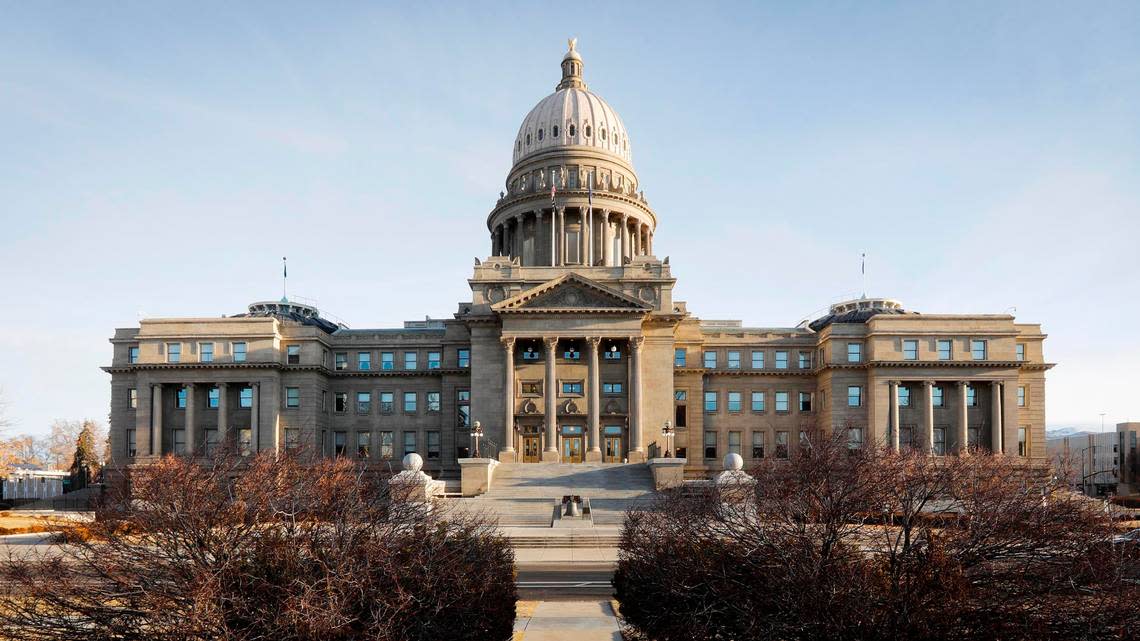You could vote on everything from president to mayor in one election in Idaho. Some hate it

- Oops!Something went wrong.Please try again later.
In its original form, Senate Bill 1111 was intended to fix a law enacted last year.
The bill, from Senate President Pro-Tem Chuck Winder, R-Boise, and Rep. Joe Palmer, R-Meridian, was supposed to answer questions remaining from a law that requires cities of more than 100,000 people to elect their city councils by districts. The law lacked direction on who would draw districts and when they would take effect. SB 1111 provided guidance on both.
Under the 2010 Census, only Boise and Meridian would be affected. So those cities worked with Winder and others to craft the cleanup bill and make it possible for the cities to create districts quickly and efficiently.
“We wanted to do it right,” Mayor Lauren McLean said Wednesday.
The bill passed the Senate unanimously last month. But last week, much to the surprise of Boise officials, SB 1111 began to change. Radically.
Rep. Gayann DeMordaunt, R-Eagle, proposed an amendment to include a requirement that nonpartisan city elections — currently held in odd-numbered years — be moved to even-numbered years, when they’d be on the ballot alongside partisan races such as those for president, the Legislature and county commissions. DeMordaunt said that would lead to greater voter turnout for municipal races.
Winder said he initially asked House members not to amend the bill when he was approached about it three weeks ago.
But it became apparent that House members would amend it anyway, Winder said, so he eventually worked with DeMourdant and Chief Deputy Attorney General Brian Kane to ensure that the House wouldn’t delay redistricting, the decennial process of drawing new legislative boundaries.
“That kind of increase in turnout is worth our best efforts as a Legislature to encourage and develop policies … to respect the engagement of our voters,” DeMordaunt said.
Ada County election results show that federal election cycles do bring a higher percentage of voters to the polls.
In November 2019, when Boise, Eagle, Star, Kuna and Meridian all voted for mayor and city council members (and Garden City voted for council members only), one-third of the county’s more than 250,000 registered voters showed up. In the 2020 general election, when the presidential election was on the ballot, 87.8% of Ada County’s nearly 300,000 registered voters did.
Boise officials say they worry the changes would create lengthy ballots where voters aren’t able to pay enough attention to local issues.
Kathy Griesmyer, the city’s director of government affairs, and McLean said they would rather see the bill die and work within the confines of last year’s law than have city elections in even-numbered years.
“Sure, you might have more people in terms of numbers voting in general, but that doesn’t guarantee that you have more people actually engaging directly in those municipal races,” Griesmyer said in a phone interview. “It’s very possible somebody just goes and votes for president and then doesn’t engage in the rest of the down-ballot races.”
McLean, who ran in several Boise City Council races before winning the mayoral race in 2019 after a runoff, said the House changes would make it “much harder for residents to truly engage on a local level.”
“I just think that it’s not in the best interest of the people of the state and our community and others to have to wade through all that to try to make decisions on what could be page four, five or six of a ballot when it comes to a city election,” McLean said at a news conference.
The bill’s opponents in the Legislature made the same argument. House Minority Leader Ilana Rubel, D-Boise, said that even as a state candidate, it was hard to cut through political chatter in the 2020 election cycle when people were largely focused on the presidential election.
In 2019 in Boise, the mayoral election “was the dominant event,” Rubel said Wednesday on the House floor. “Everybody was out there talking about things like should we have a stadium, should we upgrade our library ... nonpartisan but really important municipal issues were dominating the headlines and were things people were listening to and caring about. That would not have happened if that election would have occurred in 2020.”
City candidates and city issues, comparatively, “don’t have a prayer of breaking through that noise in even-year elections,” she said.
A Statesman data analysis found that at least in Boise, moving the election to even-numbered years likely not radically shift the balance of power in the city.
Though their offices are nonpartisan, McLean and several members of the council are Democrats. In almost every Boise precinct, voters have largely (but not exclusively) chosen Democrats in the last two partisan elections. A strong conservative candidate could sway voters, though, particularly in the westernmost parts of the city.
The bill with DeMordaunt’s amendment passed the House 53-16, with four Republicans joining all the Democrats to vote against. It now heads back to the Senate.
Hayat Norimine contributed to this story.

